Thanks to Our Volunteers! – June 2025 Community Wildlife Chapter Updates
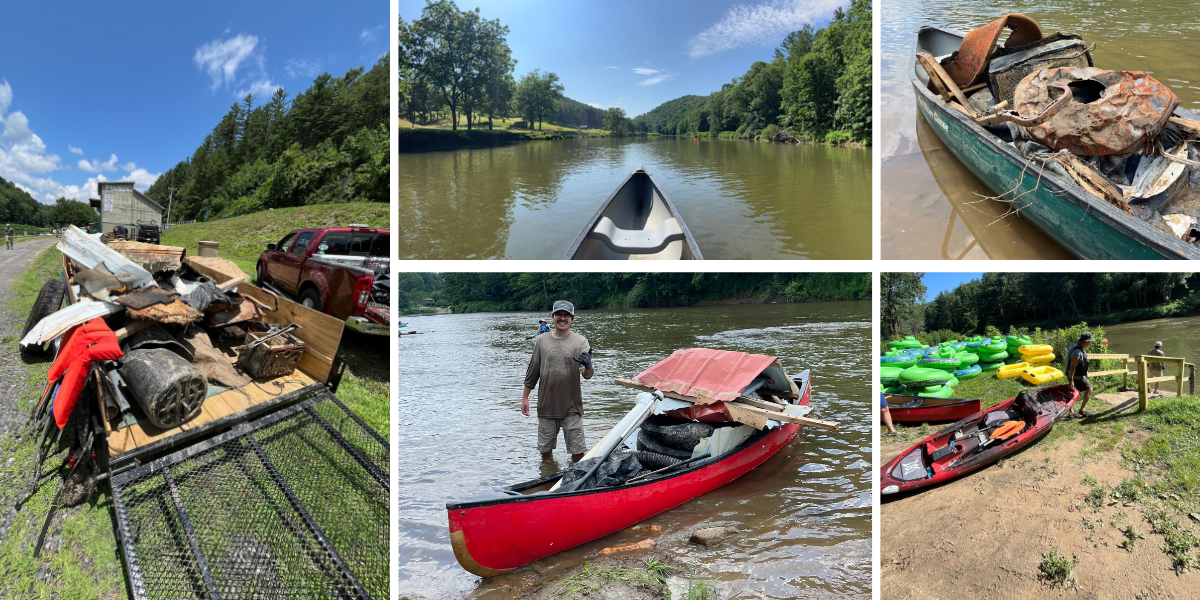
North Carolina Wildlife Federation staff and Community Wildlife Chapter volunteers embraced the heat throughout the month of June. They connected people to the outdoors with a variety of wildlife and habitat opportunities. Invasive species removing, habitat stewards training, salamander searching, chimney swift viewing, river paddling, and much more! In June, 711 people were given the opportunity to connect with nature through one of NCWF’s 38 events! This month from the mountains to the sea, 7,400 lbs of litter were removed from the landscape and 475 native pollinator plants and trees were planted in the ground by NCWF Community Wildlife Chapters and partners.
Thanks to partners for helping make these habitat restoration workdays, educational programs and nature outings possible. Explore our Events Calendar to discover where NCWF and our Community Wildlife Chapters are hosting in-person and virtual events near you. Check out a few highlights below from our conservation outreach team.
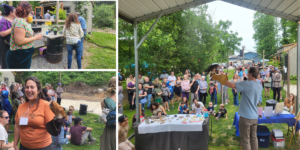
May 24, Birds & Brews Festival: The North Carolina Wildlife Federation was a partner in Wild Birds Unlimited’s annual Birds & Brews event in Asheville. Participants learned all about bird behavior, native plants, how to create habitat for wildlife, and much more!
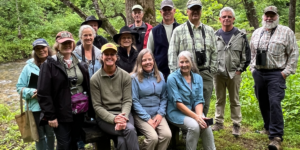
May 28, NC Bird Atlas Walk: The North Carolina Wildlife Federation in partnership with the North Carolina Wildlife Resources Commission hosted a bird walk in Lenoir to promote the last year of the NC Bird Atlas and work toward completing a priority block. The NC Bird Atlas is a statewide community science project to map birds during the breeding and wintering seasons. The goal of the bird atlas is to help us understand the current and future distribution and abundance of our state’s birds. Having this detailed picture as a result of the atlas will be an incredibly important source of data moving forward to make more informed management and conservation decisions across the state.
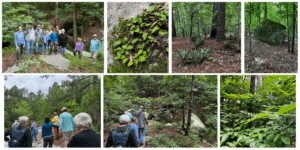
May 29, NRHC Nature Walk at Main Street Park Property: NCWF Neuse River Hawks Conservationists Chapter went on a nature walk through the woods in Rolesville. The group hiked over granite flatrock outcroppings covered in resurrection fern. The hikers discovered a not-so-happy opossum parent tucked into the rock hissing and protecting its young. Chapter leaders pointed out unusual plants for the piedmont, including prickly pear cactus and native curlyleaf yucca plants, which enjoy the hot microclimate created by these outcroppings.
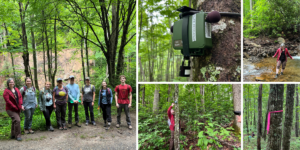
May 29, Cerulean Warbler & Avian Diversity Study: The North Carolina Wildlife Federation led volunteers in the field to monitor and record cerulean warblers within Craggy Mountains – Pisgah National Forest where the presence of ceruleans and many other avian species is largely unknown. The survey is a collaborative effort between the North Carolina Wildlife Federation, National Parks Conservation Association, the Center for Biological Diversity, Defenders of Wildlife, MountainTrue, and the N.C. Wildlife Resources Commission with support from the U.S. Forest Service.
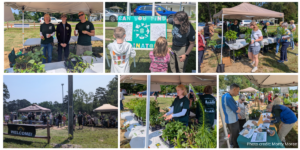
May 31, SWC Native Plant Sale: NCWF South Wake Conservationists Chapter hosted a native plant sale at Simple Gifts Community Garden in Apex. Seventeen species of native pollinator plants were sold (and sold quickly!) as the community showed up strong to plant native. The morning consisted of garden tours and pollinator activities for kids, in addition to the sale.
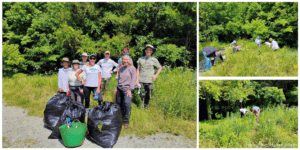
May 31, Tri-County FLOHA Invasive Removal: NCWF Tri-County Conservationists Chapter partnered with Friends of Lower Haw (FLOHA) to continue their work removing invasive plants in Pittsboro. Volunteers helped remove lespedeza from FLOHA’s Butterfly Highway pollinator garden.
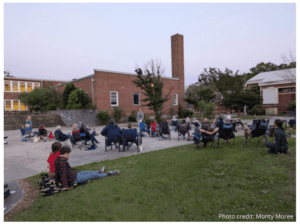
June 2, SWC Chimney Swift Viewing: NCWF South Wake Conservationists Chapter held a Chimney Swift Viewing in Fuquay-Varina. Over 50 people of all ages watched as chimney swifts flew in to roost for the night in their magnificent display. Representatives from Wake Audubon shared information about the statistics and habits of chimney swifts as well as the history of the nearly 100 year old chimney that the swifts frequent.
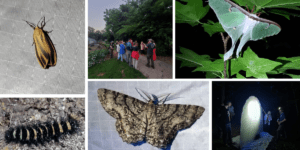
June 3, UCWC Moth Night: NCWF Union County Wildlife Chapter hosted moth night in the Teaching Garden at the Union County Agricultural Center. As the sun went down, twenty nature enthusiasts of all walks of life joined Mecklenburg County Natural Resource staff and Union County Wildlife volunteers for an evening of fun! Moths were out in full force by nightfall. Familiar friends, including the charming rosy maple moth and the majestic luna moth, greeted eager observers. The painted lichen moth and the agreeable tiger moth, although less familiar, were huge hits.
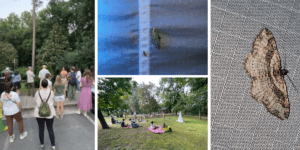
June 3, HAWK Moth Night at Squirrel Lake Park: NCWF Habitat and Wildlife Keepers Chapter invited family and friends to join the chapter for a Moth Night at Squirrel Lake Park in Matthews. Local Biologist and ecology expert Ken Kneidel set up black lights and moth sheets, demonstrating how to collect, identify, and catalog local moth species during this community science adventure.
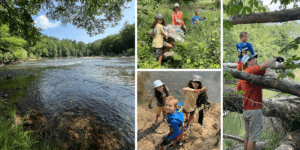
June 4, Wagner Access Cleanup: New River Conservancy, Keep Ashe Beautiful, and NCWF’s High Country Wild got together for a clean-up and debris removal at New River State Park in Ashe County. Trash and debris in waterways create a host of problems for wildlife including entanglement, ingestion, habitat contamination, and degraded water quality. Cleanup efforts are vital in keeping our waterways clean and maintaining suitable habitat for wildlife. The crew removed 1500 pounds of garbage!
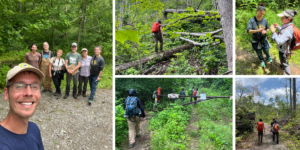
June 5, Cerulean Warbler & Avian Diversity Study: NCWF led volunteers in the field to monitor and record cerulean warblers within Craggy Mountains – Pisgah National Forest where the presence of ceruleans and many other avian species is largely unknown. The survey is a collaborative effort between the North Carolina Wildlife Federation, National Parks Conservation Association, the Center for Biological Diversity, Defenders of Wildlife, MountainTrue, and the N.C. Wildlife Resources Commission with support from the U.S. Forest Service.
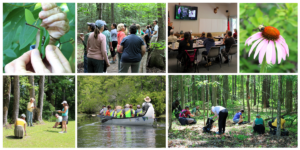
June 6-8, NCWF Northeastern NC Wildlife Habitat Stewards Training: NCWF and NCWF Wildlife Habitat Stewards of Northeastern NC Chapter brought together participants from across the region (and state) for this three-day training opportunity to glean the skills necessary to support wildlife and habitat on their own properties and within their greater communities. The training was held at Merchants Millpond State Park where participants enjoyed exploring the park’s unique habitats and observing the biodiversity of the park through hands-on activities and presentations from esteemed conservation professionals. Our newly certified wildlife habitat stewards also helped remove invasive Japanese stiltgrass and planted over 300 plugs of native grasses to support wildlife and habitat!

June 7, CWA Vulcan Quarry Tour: NCWF Concord Wildlife Alliance chapter joined their partners at Vulcan Materials for a wildlife and habitat tour of Vulcan Quarry in Concord. The quarry is certified by the Wildlife Habitat Council as a sanctioned, enhanced habitat for indigenous wildlife on corporate lands. Participants were shuttled around the property, stopping at various sites along the way to discuss wildlife and habitat!
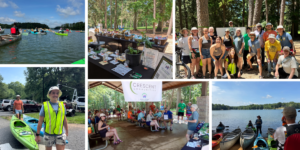
June 7, CWS Wild on the Water: NCWF Charlotte Wildlife Stewards chapter hosted their annual paddle and fundraiser at Latta Nature Preserve in Huntersville. In total, over 40 folks set out for a guided paddle on Mountain Island Lake. Paddlers saw nesting ospreys and Eastern kingbirds. Native wetland plants like pickerelweed, lizard’s tail, and buttonbush were in bloom. After the paddle, participants enjoyed a picnic lunch and a raffle with prizes valued at over $4000. Money raised will go towards wildlife projects and family and youth engagement in Mecklenburg County.
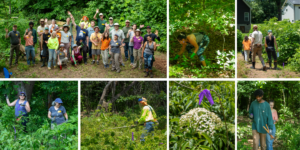
June 8, Fox Creek Park Workday: NCWF Swannanoa Valley WILD! and the Friends of Fox Creek Park hosted a workday at Fox Creek Park in Swannanoa. Hurricane Helene flooded Fox Creek with a torrent of muddy water and debris, and as the surge retreated the park was left with scattered trash, re-made stream beds, and a heavy deposit of silt covering much of the park. The workday included invasive removal, trail clearing while volunteers spotted a variety of wildlife including red-shouldered hawks, wood thrushes, and plenty of elderberry. Afterwards, the group gathered for food to celebrate the park and the restoration progress. 30 volunteers joined the fun!

June 10, TW! Wildlife Trivia at The Loaded Grape: NCWF Triad Wild! Chapter hosted their first ever wildlife trivia night at The Loaded Grape in Greensboro. Participants played six rounds of North Carolina wildlife-themed trivia with categories like: under the sea things, flying things, creepy crawly things, and even a round about NC watersheds. The chapter held a raffle to raise money for local wildlife projects and awarded a prize to the winning trivia team. Everyone learned a thing or two about NC wildlife!
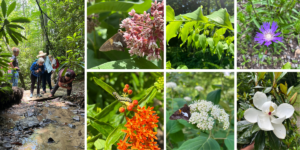
June 10, Flora & Fauna Walk in Fairview: NCWF in partnership with Wlydhaven Homestead hosted a nature walk with Michelle Pentecost – a long time friend of NCWF. Participants were treated to a full tour of the property and discovered an abundance of biodiversity and wildlife along the way.

June 10, Tyrrell County Library Kickoff to Summer Reading Program: NCWF and Pocosin Lakes NWR participated in Tyrrell County Library’s Kickoff to Summer Reading program event for this summer’s “Color Your World” theme. Children and adults alike learned all about the animals that call Northeastern NC home and explored the many different colors they come in!
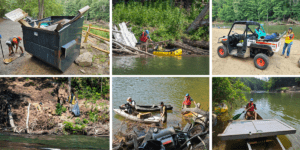
June 11, Elk Shoals Cleanup: New River Conservancy, Keep Ashe Beautiful, and NCWF’s High Country Wild got together for a clean-up and debris removal at New River State Park in Ashe County. Trash and debris in waterways create a host of problems for wildlife including entanglement, ingestion, habitat contamination, and degraded water quality. Cleanup efforts are vital in keeping our waterways clean and maintaining suitable habitat for wildlife. The crew removed 1600 pounds of garbage!
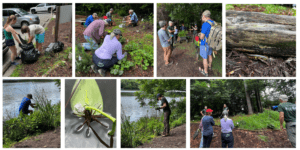
June 14, SWC Aquatic Planting and Pollinator Garden Cleanup at Bass Lake Park: NCWF South Wake Conservationists Chapter held an aquatic planting and pollinator garden workday at Bass Lake Park in Holly Springs. Volunteers planted pickerel weed and button bushes by the lake and helped weed the demonstration pollinator garden. The plants that went in the ground will support pollinators and will provide habitat for small fishes and macroinvertebrates in the lake. Speaking of wildlife, during the workday volunteers encountered toads, worm snakes, a newly molted dragonfly, and a bald eagle fly-over!
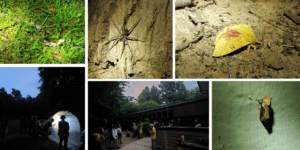
June 16, CWS Moth Night: Mecklenburg County Natural Resources staff joined NCWF Charlotte Wildlife Stewards chapter to kick off National Pollinator Week with Moth Night. Despite nearby thunderstorms, the rain held long enough for folks to participate in mothing. Many for the first time. Micromoths came to the sheets in big numbers, but the large and beautiful Io moth stole the show. Toads, millipedes, and even a gorgeous copperhead also made an appearance.
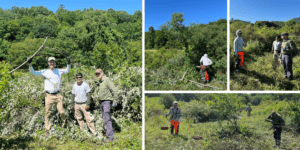
June 20, Bowditch Bottoms Invasive Species Removal: The North Carolina Wildlife Federation in partnership with Southern Appalachian Highlands Conservancy hosted an invasive species removal at Bowditch Bottoms (SAHC owned site) in Yancey County. Bowditch Bottoms contains mixed hardwood forest, cleared agricultural fields, valuable wetland habitat within the South Toe River Watershed, and a riparian area that buffers over a half mile of Ayles Creek. The crew removed invasive species – primarily multiflora rose and autumn olive that are established within the site’s wetland areas.
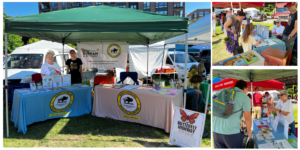
June 21, DWS Durham Bee Day: NCWF Durham Wildlife Stewards Chapter participated in Durham Bee Day in downtown Durham. In honor of National Pollinator week, the chapter braved the heat and engaged with community members about the Butterfly Highway Program and DWS. They also had pollinator crafts and games for kids!
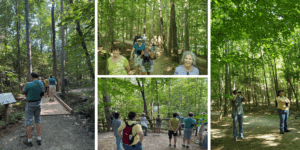
June 21, UCWC Guided Bird Walk: NCWF and NCWF Union County Wildlife Chapter partnered to host a guided bird walk at Dogwood Park in Wesley Chapel. A passionate group of wildlife enthusiasts braved the June heat to search for summer breeding birds. While the birding was slow, the enthusiasm was not. A ruby-throated hummingbird and several raucous blue jays made appearances. Participants even got a glimpse of a summer tanager at the end. Calling frogs and annual cicadas filled the voids during this morning stroll.
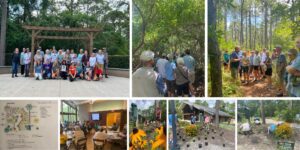
June 20-22, Wildlife Habitat Stewards Training: Page and Mary held a 3-day workshop at Halyburton Park in Wilmington, certifying 29 new volunteers as habitat stewards in the southeast. Participants learned about insects from NCSU extension agents, plant communities of the southeast and mammal diversity from UNCW professors, birds and their food sources from Audubon, the history and land use change of Carolina Bays from city park staff, amphibians and reptiles from WRC, how to conduct a site assessment from landscape architects, how to approach ecological restoration from park rangers, and how to use fire on the landscape from the forest service. 15 new species were added to the pollinator garden at Halyburton to increase forage, shelter, and places to raise young.
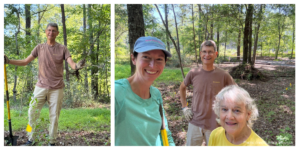
June 21, NRHC Invasive Removal at Main Street Park: NCWF Neuse River Hawks Conservationists Chapter hosted an invasive plant removal at Main Street Park in Rolesville. Volunteers helped remove Japanese stiltgrass, privet, and multiflora rose from a large section of forest behind the park’s playground.
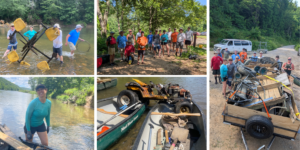
June 22, South Fork of the New River Cleanup: New River Conservancy, Dusty Trail Outfitters, Riverside Canoe, and NCWF’s High Country Wild got together for a clean-up and debris removal on the South Fork of the New River in Ashe County starting at the Plumb Nearly down to Riverside Canoe. Trash and debris in waterways create a host of problems for wildlife including entanglement, ingestion, habitat contamination, and degraded water quality. Cleanup efforts are vital in keeping our waterways clean and maintaining suitable habitat for wildlife. The crew removed over 2 thousand pounds of garbage!
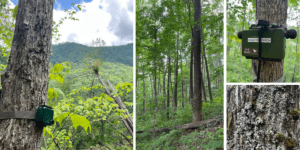
June 23, Cerulean Warbler & Avian Diversity Study: NCWF led volunteers in the field to monitor and record cerulean warblers within Craggy Mountains – Pisgah National Forest where the presence of ceruleans and many other avian species is largely unknown. The survey is a collaborative effort between the North Carolina Wildlife Federation, National Parks Conservation Association, the Center for Biological Diversity, Defenders of Wildlife, MountainTrue, and the N.C. Wildlife Resources Commission with support from the U.S. Forest Service.
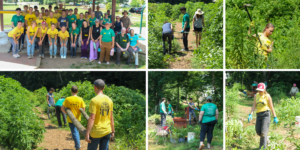
June 24, Fox Creek Park Workday: NCWF Swannanoa Valley WILD! and the Friends of Fox Creek Park hosted a workday at Fox Creek Park in Swannanoa for a group of 40 student volunteers. Fox Creek Park is a story of restoration, ecology, and community. What was once a curtain of kudzu and a blanket of multiflora rose has been restored and reclaimed for wildlife. And the job is not done! Restoration is an ongoing process and that chapter will continue to host consistent workdays at Fox Creek.
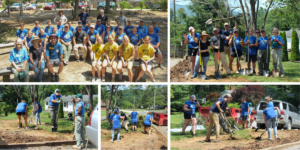
June 25, Grovemont Park Workday: NCWF Swannanoa Valley WILD! and the Friends of Grovemont Park hosted a workday at Grovemont Park in Swannanoa for a group of 40 student volunteers. There were multiple projects running simultaneously with a focus on enriching and restoring the park. The crew was especially excited that they were able to lay the groundwork for a new pollinator garden!
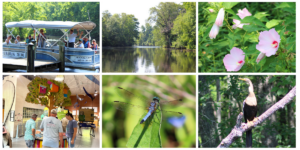
June 26, Cashie River Rambling Boat Tour: NCWF Wildlife Habitat Stewards of Northeastern NC Chapter hosted a Cashie River Rambling Boat Tour in partnership with the Roanoke/Cashie River Center in Windsor. During the tour, participants enjoyed viewing plants and wildlife along the Cashie River and had the chance to listen for neotropical migratory birds from the boat.
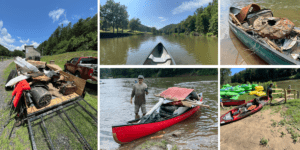
June 28, New River Clean Up: New River Conservancy, Keep Ashe Beautiful, and NCWF’s High Country Wild got together for a clean-up and debris removal on the New River in Ashe County. Trash and debris in waterways create a host of problems for wildlife including entanglement, ingestion, habitat contamination, and degraded water quality. Cleanup efforts are vital in keeping our waterways clean and maintaining suitable habitat for wildlife. The crew removed nearly 2 thousand pounds of garbage!
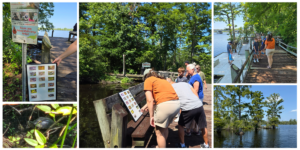
June 28, ecoEXPLORE Herp Hike: NCWF and Pocosin Lakes NWR partnered with Tyrrell County Library for a “herp hike” along the Scuppernong River Boardwalk to observe reptiles and amphibians for this month’s Herpetology Badge. ecoEXPLORErs were able to view a variety of species such as yellow-bellied sliders, Eastern mud turtles, a painted turtle, and an American bullfrog.
Written by:

– Page Turner, Conservation Coordinator
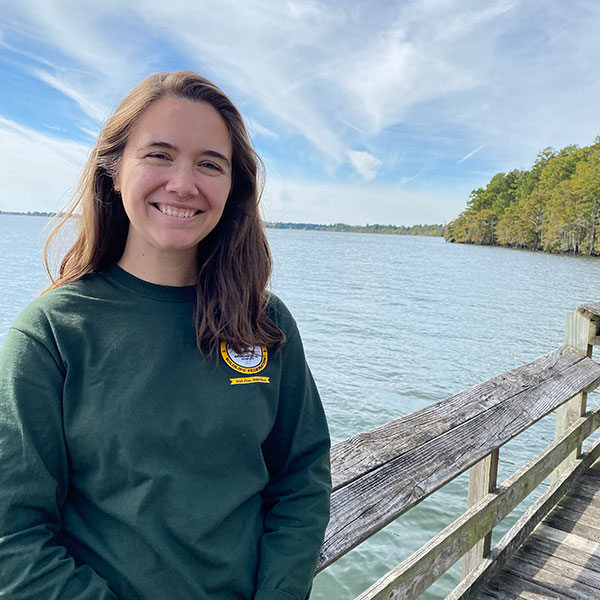
– Laura Frazier, Refuge Conservation Coordinator
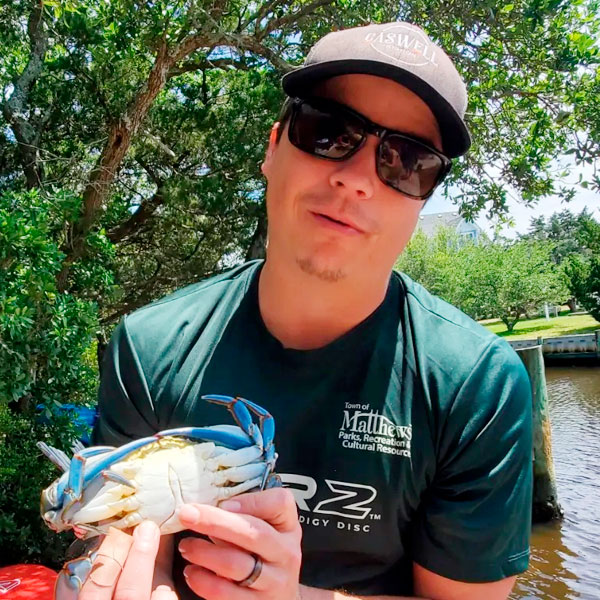
– Alden Picard, Conservation Coordinator

– Kara Solomon, Conservation Coordinator

– Luke Bennett, NCWF Conservation Coordinator

